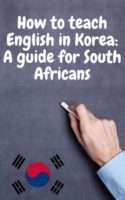Have a student loan? Need to find a job using your degree? Dream of traveling? Teaching English in South Korea suits all three.
South Korea (AKA: The Republic of Korea) is a small East Asian country with a population size similar to South Africa, even though its geographic size is closer to KwaZulu-Natal. Since the mid-90s, Korea has had an English programme called the English Programme in Korea (EPIK). According to EPIK’s website:
“EPIK has had the goals of improving the English-speaking abilities of Korean students and teachers, developing cultural exchange between Korea and abroad, and of introducing new teaching methods into the Korean education system.”
Affiliated with the Korean Ministry of Education, EPIK is the programme you will want to be working for should you wish to teach English as a foreign language for South Korea’s public schools (mostly elementary).
Though you can apply directly with EPIK, there are recruitment agencies that facilitate your application. Among them Korvia Consulting has the best reputation and offers their services free of charge. They are EPIK’s exclusive partner and help you every step of the way. They are likely to go out of their way to help you enter the EPIK programme.
You can work for private schools too, referred to as Hagwons. Their requirements, salaries and working conditions do vary though. Depending on what you are looking for, a Hagwon may be better (or not) suited for you.
Why you should consider teaching English in Korea*
As a South African, not only is the salary attractive, (starting between R24 000 and R30 000 per month) but due to historical ties between the two countries, you are exempt from paying tax for your first two years as an English teacher!
Korea is extremely safe ‒ it is one of the safest countries in the world to travel as a solo female traveller. Koreans are extremely kind and good natured too. Additionally, there is no load shedding…
There are some incredible perks included in working for EPIK. Your accommodation is paid for, you get a flight reimbursement (+- R16 000), an entrance allowance (+- R4000) AND a settlement allowance (+- R17 500 though you must complete at least the first six months of your contract in order to keep it). They also pay you a whole month’s salary as a bonus when you finish!
NB: You need to pay for your flight and roughly the first two months living expenses yourself before you get a Korean bank account. EPIK advises bringing around (R15 000) for this time. Flights vary so check in advance if it’s viable for you.
Do you meet the requirements?
Besides a matric exemption you will need to have been educated in English as your first language at both your primary and high school (EPIK requires a letter from both proving this). Try not to throw any SA slang into your interviews!
A degree from a tertiary institution is also required but it does not have to be a teaching or English degree. Lastly, you will need at least a 120 hour TEFL (Teaching English as a foreign language) certificate. These are easy to get, however, you have to pay for it with your own funds. They often have specials so don’t rush into buying one.
How do you get to Korea?
There are quite a few documents you need to get in order to successfully travel to and work in Korea. You will need to do an initial document submission followed by an interview. If you are successful you will then be invited to submit final documents and book your flight!
Korvia Consulting is extremely helpful in walking you through the document process though EPIK gives you a document guide too.
Korea offers a great opportunity to make money, explore and meet new people. For a better idea of life as a South African English teacher in Korea, refer to part 2 of this guide.
*Figures are rough estimates of KRW converted to ZAR at the time this article was written.



